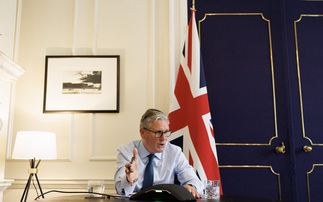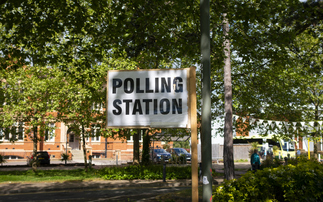You would be forgiven for fearing the depressing and dangerous process of normalisation that has greeted Donald Trump's shock victory has reached as far as Marrakesh.
The party line from diplomats gathered at the COP22 Summit appears to be an optimistic/deluded insistence President-elect Trump could yet be convinced to honour US climate commitments, backed by the more credible assumption that even if the US exits the Paris Agreement basic economics mean the White House will find it difficult to push America back on to a high carbon development path. The hope is Trump won't do what he says he'll do, can't do what he says he'll do, and even if he does it doesn't matter.
Such an upbeat assessment is understandable. It is psychologically, economically and politically important to remain positive, in order to help ensure the hostility to climate action that has infected the new White House does not prove contagious for other major economies.
But if the last week has taught us anything, it is always important to have a plan B. As such, it is encouraging to see signs those diplomats publicly suggesting Trump could shift his stance on climate change are privately working on what to do if he does precisely what he has said he will do and leaves the Paris Agreement. Too much has already been lost betting against Trump's willingness to be tamed by the laws of political gravity and economic logic. It is time to start hoping for the best and assuming the absolute worst.
Of course, some of Trump's anti-environmental tendencies will be constrained by the courts, the states, the Democrats, and the falling cost of clean tech. As I argued last week, this is a crisis, but not yet a catastrophe.
But if Trump and his Republican allies make good on just a handful of their myriad pro-pollution policies global efforts to keep temperature increases below 2C are facing their most daunting challenge in modern history. As an eye-watering analysis from Vox notes, the Republican Party will give Trump full spectrum support for his proposals to "cancel" the Paris Agreement, axe Obama's Clean Power Plan, and de-fang the EPA. On top of that little 'listicle from hell' the GOP leadership in Congress has a raft of anti-environmental measures that are good to go and numerous legislative options for delivering them.
For various historical reasons the modern Republican Party is the most unequivocally polluter friendly political organisation on the planet. The GOP leadership never met a toxin it didn't like. They are, to coin a phrase, the enemies of the people's air and the people's water. The Party's stated environmental agenda reads like the opening chapter of a dystopian Margaret Atwood novel, and its leadership is desperate to see how the rest of the book pans out.
There are credible reasons to hope Trump may pivot away from some of his more extreme campaign pledges - parts of the Mexican border wall are already being downgraded to a fence, key components of Obamacare will remain, it seems unlikely Hillary Clinton will be fitted for prison uniform - but there are fewer reasons to think the President-elect will temper his scientifically illiterate stance on climate change once he is ensconced in the soon to be gold-leafed Oval Office.
And even if Trump had a change of heart on climate policy he would face uproar from Republicans in Congress, his fossil fuel donors, and keys parts of his base. Staunch opposition and the Trump team's rank incompetence may slow attempts to dismantle US climate action, but green businesses, investors, and political leaders need to be aware that this is their end goal.
So how should the rest of the world respond to this threat to the post-Paris Agreement consensus?
Obviously, the first step is to keep building on their commitment to deliver their own ambitious domestic climate policies in an attempt to compensate for US backsliding and exploit the huge green economic opportunities that will come if the American government seeks to absent itself from the next great industrial revolution. On this front, the immediate rush to defend the Paris Agreement by Europe and more importantly China, Australia, and Saudi Arabia has provided one of the few bright spots during a uniquely bleak week.
But renewed domestic action alone will not be enough to compensate for a US effort to push the world past 2C of warming trajectory, nor will it discourage some other carbon intensive economies from responding to US free-riding by soft pedalling with their own decarbonisation efforts.
Consequently, if Trump does declare war on global climate action some sort of resistance will be required.
Critics of the Paris Agreement have long argued the voluntary nature of the national action plans countries have submitted make the treaty toothless. But the reality is that while key elements of the deal may not be legally binding it still has teeth if governments care to show them.
In the wake of last year's Paris Agreement, the satirists at America's Daily Show argued the enforcement procedures for the Treaty amounted to "1. Side eye; 2. Losing Twitter followers; and 3. Looking a bit of a dick". But as I noted at the time, in a world of soft power and multinational investment decisions, international pariah status is something no economy should aspire to.
If Trump exits the Paris Agreement condemnation and economic power games will quickly follow. The opposite of so-called carbon leakage fears were once described by former UK Energy and Climate Change Secretary Ed Davey as low carbon leakage. This is precisely what would happen. A country that is openly hostile to clean technologies will quickly see the world's most exciting and innovative firms migrate to more welcoming shores.
Expect Canada's Justin Trudeau to put out the welcome mat for US clean tech firms, touting his country's new carbon tax and renewables procurement policies. Expect China and the EU to step up efforts to establish themselves as the world's premier clean tech hub at America's expense. China has already said it sees a huge opportunity to take on a new global leadership role as Trumpism threatens to absent the US from the global stage.
A spokesman for the Competitive Enterprise Institute told Channel 4 News this week the rest of the world is welcome to green jobs. Let's see if Republican politicians agree when factories are closing in their districts, constituents are complaining about their air and water quality, and China's economic muscle is going from strength to strength.
Trump would probably weather attempts to poach US clean tech companies, but other nations also have a nuclear option at their disposal that would simply require them to adapt protectionist policies Trump himself insists he will enact. As the always combative French Presidential candidate Nicholas Sarkozy noted over the weekend, if Trump wants to exit the Paris Agreement and make the US a free rider on the rest of the world's decarbonisation efforts then it is only logical tariffs on US exports should follow.
The EU and Germany reportedly moved quickly to downplay the prospects of such tariffs. But it is worth looking at precisely what German Environment Minister Barbara Hendricks and EU Climate Commissioner Miguel Arias Canete said.
Canete declared: "We have always said we didn't like carbon taxes - both before the US election and after. The European Commission is not thinking of any proposal on a carbon tax." But he also issued a pretty thinly veiled warning to the US, acknowledging that "we are in a positive attitude, not a negative attitude — at the moment, under present circumstances".
Hendricks also rejected Sarkozy's proposals for border tariffs, by arguing that "Germany has decided not to go down this path but opt for emissions trading". But emissions trading has already been used to influence the climate policy position of other countries in a manner not dissimilar to border tariffs. The EU's decision to include flights in and out of the bloc in the EU's emissions trading scheme (ETS) was the single biggest factor behind the International Civil Aviation Organisation's (ICAO) eventual adoption of a global carbon offset mechanism, forcing US, China and others to the negotiating table in a bid to avoid their airlines being hit by regional carbon charges. It is possible to imagine how the ETS could again be used as a more sophisticated alternative to Sarkozy's carbon import tariff proposal.
Whether the EU and others pursue border tariffs or some form of extension to their emissions trading schemes (it is worth noting at this p;oint that China is about to launch its own national carbon market), a carbon price on US imports can be economically justified if Trump exits the Paris Agreement. As Lord Stern told the FT this week, "in principle, border tax adjustments can be justified in cases where companies are being heavily subsidised by their country's government. Allowing damaging activities, such as air pollution or greenhouse gas emissions, to take place at zero cost is clearly an implicit subsidy".
Chris Hope has already done the maths and reckons a carbon tariff of around six to 10 per cent on US goods would be proportionate.
Trump's aggressive protectionist rhetoric also makes counter measures by the wider international community more politically feasible. No one wants to fire the first shot in a trade war, but if Trump follows through on his campaign threats and seeks to crack down on imports from China, Mexico, and elsewhere then the Paris Agreement gives the rest of the world even more reason to launch countermeasures.
Moreover, while Trump's threatened tariffs would aim to protect declining US 20th century industries with no end game in sight, carbon tariffs would be imposed from an economically defensible position with a view to delivering shared climate risks goals that would benefit everyone. They could be axed as soon as the US returns to the Paris Agreement and promises to take reasonable steps to curb its emissions.
Tie such protectionist moves with a continued push to deliver the proposed Environmental Trade Agreement and you have a scenario where the world ensures free trade for clean technologies and barriers on goods produced in countries with no emission reduction plan. The Trump administration could find that US solar panels and electric cars are tariff free, but the steel industry it wants to revive is hampered by its failure to take even modest steps to curb its carbon footprint.
Let us be as crystal clear as the water Trump says he wants to protect while tearing up environmental protections; this is a staggeringly sub-optimal situation.
Most advocates of free trade (and that includes you Theresa May) may not be able to define it and all too rarely acknowledge how free markets require a degree of regulatory control. The freest market is a barter economy that is a paradise for charlatans and monopolists. As such effective markets always need to be tamed in order to maximise social benefits. But while there is a balance to be struck between free markets and regulatory safeguards the economic consensus is right in its opposition to inefficient and damaging tariffs. Protectionism is only justified in the most exceptional of circumstances. We've seen this movie before. We know how trade wars typically end - in a stalemate that harms almost everyone involved.
But, in case you hadn't noticed these are pretty exceptional circumstances. A contemptible man-child with authoritarian tendencies, white nationalist allies, and a thicket of conflicts of interest that would almost certainly lead to the immediate impeachment of any other president is about to ascend to the most powerful office in the world. He has vowed to pursue an environmental and energy strategy that would all but guarantee dangerous levels of warming, condemning the entire planet, including the US, to immense economic, humanitarian, and security risks.
We have to hope Trump is more pragmatic and measured than he seems, but it is vital to neither normalise what has happened nor blithely assume encouraging technology trends in recent years mean everything will be OK. The rest of the world and the majority of US voters who opposed Trump need a new and robust plan to protect the planet, and if protectionism has to be a part of that so be it.










